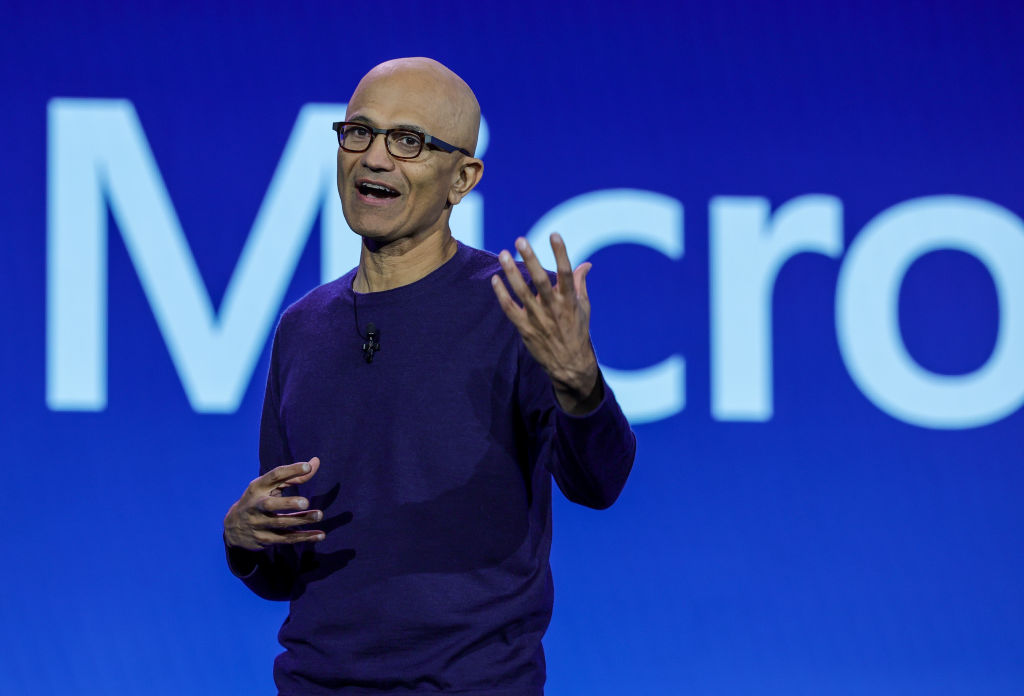One of the world’s most powerful men was trapped in a central London basement this morning. Satya Nadella, the CEO of Microsoft, had come down to the lower ground floor of Chatham House to talk to the former chief mandarin of the Foreign Office about artificial intelligence. He had precisely 40 minutes, our host said, because he needed to catch a plane to Davos. ‘Thank you for choosing Chatham House for your London destination’, Nadella was told, in the same way that passengers are thanked for ‘choosing’ Ryanair to Dublin. Chatham House was the perfect stage: if you want somewhere to talk about the impact of things, how to harness things, and how to discover the potential of things, you come here. This is lanyard Valhalla.
Nadella is arguably the most impressive CEO of the 21st century after Microsoft last year overtook Apple to become the world’s most valuable company. He was born in Hyderabad, India, moved to the US, and joined Microsoft as an engineer in 1992. Three decades on, a quarter of a million people work for him and I am writing this on one of his platforms (Word). He became CEO in 2014, reinvigorating a company that had fallen behind Apple as it launched the iPhone and the iPad. Nadella has done that by buying things. In nine years, he has completed 326 deals worth more than $170 billion, with Microsoft buying its crown jewels of GitHub, LinkedIn and most recently Activision Blizzard, following a two-year back and forth with antitrust regulators. Microsoft’s revenue has tripled and its share price is eight times higher under his leadership. As one commentator put it, ‘he edges out Steve Jobs simply because he turned around Microsoft without the benefit of the clout that comes from being the founder.’
He’s an unassuming man – despite being one of the richest people in the world, he could probably use the Tube without being recognised. There’s no Musk-like leather jacket, no Jobs-like turtleneck, no Gates-like nerdishness. He’s still too rich to wear a tie, though.
He’s also at the centre of the development of AI. Microsoft owns 49 per cent of OpenAI, the company behind ChatGPT. At Chatham House, he spoke with an accelerationist’s zeal about the technology, saying that what we have invented is a ‘new reasoning agent… a neural reasoning agent’. The metaphor he likes about artificial intelligence is that it can be your ‘co-pilot’. Microsoft Copilot launched last year, which can give you an ‘AI companion that works everywhere you do and intelligently adapts to your needs’.
And we better get used to it, he said. ‘If 2023 was the year we built a lot, then 2024 will be the year of even greater heights in terms of everyday usage.’ The stakes are high, as our productivity splutters: ‘We need a technological breakthrough, a new factor of production’. Nadella pointed to a success story from his own backyard: Microsoft has been using an AI algorithm to work out what materials can be eliminated from batteries. Last week they announced they had found a battery design that uses 70 per cent less lithium. Think of the lives lost down the mines that could save.
Satya Nadella says that AI will be humanity’s ‘co-pilot’
The problem is that the artificial intelligence described by Nadella sounds much, much brighter than humans. Why then should we expect it to serve us? As ever at these kind of events, that question wasn’t confronted explicitly: instead there was vague talk about keeping an eye on that one. Perhaps it was too nice a morning for existential dread.
That wasn’t the only concern raised. What about those that worry they will lose their jobs to the AI? Well, don’t worry, says Nadella. There’s something called the ‘lump of labour fallacy’, that explains that there is no fixed amount of work in the economy, and that AI will simply free up resources for other tasks. ‘There will be jobs’, he reassured the nervy white-collar crowd.
There was a pleasing realism, however, when it came to the subject of AI bias. Many, such as vice president Kamala Harris, have suggested that AI is needlessly introducing bigotry into the world. But that’s not how it works. Large language models, like ChatGPT, have been trained on an enormous range of human texts. ChatGPT – without interference – is basically a digital mirror through which humanity can see something approaching the sum total of itself. Nadella said that ‘bias exists in the real world’, so the question is whether you want to ‘unbias the AI from the biases of humans’. And maybe we do. There’s an understandable desire to take away control from flawed and rotten humans and give it to the much cleverer machines. But we know what happens when we unthinkingly trust The Machine: look at the Post Office scandal.
Satya Nadella says that AI will be humanity’s ‘co-pilot’. But it might be more realistic to say that artificial intelligence could become the pilot itself, doing everything from driving us around to taking on the drudgery of our jobs to making us happy. Microsoft – as the world’s largest company and the piggybank behind OpenAI – is the most significant company hurling us toward that future. If that world sounds like heaven, thank Satya Nadella. If it sounds like hell, Satya Nadella will be to blame.







Comments